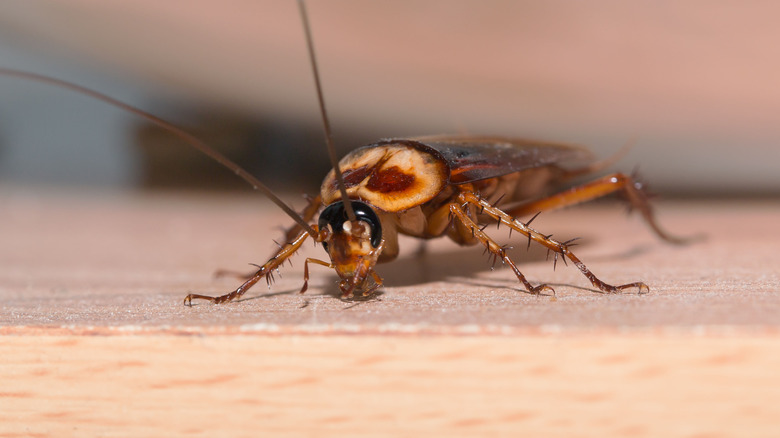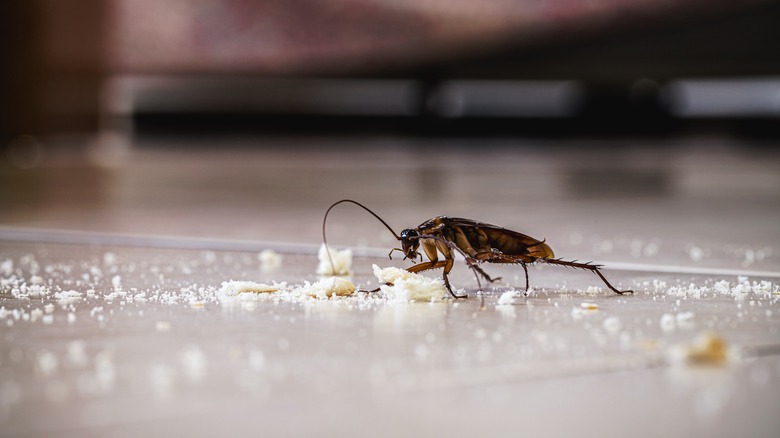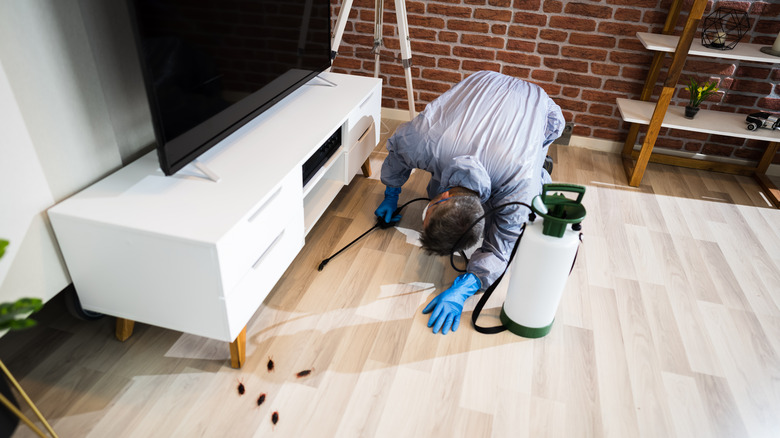Our Pest Control Expert's Tips For Treating Roaches In Your Home (And When To Call The Pros)
Do you think roaches are lurking in your home? Does a sudden scurrying across the floor in a dark corner send you running? House Digest spoke to Ian Williams, BCE, technical service manager at Orkin, in an exclusive interview to get tips and strategies for dealing with roaches in the home. He told us, "Cockroaches are better at hiding than you are at finding them, and their eggs are naturally protected from many over-the-counter products. Without special equipment, materials, and know-how, cockroach control can be a losing battle." Without a doubt, leaving this problem to the pros is ideal, but there are steps you can take to protect your home.
If you suspect you have a cockroach infestation, don't just head out to buy any treatment. Instead, Williams recommends you start with some research: "It's important to figure out which type of cockroach you are dealing with. The places you might look and ways you might treat the issue can depend on the species." He continued, "Various universities and some county extension services can provide online guides for ID." Identification is the first step, but the next is knowing how to treat the actual problem in your home.
Speaking of Orkin's processes, Williams shared, "We always aim to practice Integrated Pest Management (IPM) with all pests. This means understanding what you are dealing with, why it might be there, and then prioritizing and addressing all the management opportunities in concert."
Here's what you should know if you have roaches
You know they're there, but how do you get rid of the cockroaches? In his exclusive interview with House Digest, Ian Williams noted, "We want to make homes less accessible (sealing and repairing) and less inviting (cleaning up food and grime, vacuuming, removing moisture) before using the right products in the right amounts and the right places — together, these steps all lead to success."
To do that, Williams offered a few specific recommendations for property owners, starting with what may be the most obvious: "Cleaning up any food debris can make it harder for roaches to find food — even that gunk that builds up next to your oven range or behind the coffee maker!" You don't have to stop at the gunk; Williams continued, "A vacuum can also remove roaches. Just make sure to empty the vacuum in case there are any survivors and place them in bagged garbage outside of your home. Use a vacuum with a HEPA filter, if possible, to avoid aerosolizing any cockroach skin or feces."
Now that the roaches are out, keep them that way. Williams recommends a few steps: "Seal up cracks and crevices with caulking or sealant. By removing areas where cockroaches might hide or access your living areas, they are less likely to become established. Common areas include escutcheon plates under sinks around piping and countertops-to-backsplash gaps. Make sure windows and doors have properly fitting screening and weather seals." Also, take care of any leaks or moisture, and try not to allow empty boxes and packaging to pile up, since these can all be attractants to roaches, Williams advised.
Call a professional for roach control
If you spot roaches, your knee-jerk reaction might be to head to a home improvement store and throw everything you can at them, but that's a significant mistake. Ian Williams shared in his exclusive interview with House Digest, "Be careful with over-the-counter treatments. Depending on the roach species, different types of treatments can potentially make the problem worse or harder to solve. Not every product labeled 'for roaches' is the best product for them. And always follow all of the label's safety instructions. Lastly, more product is not better."
The more effective option is to turn to a professional pest control specialist. "Getting rid of roaches and keeping them out of your home or building is an ongoing process, not a one-time treatment, so it's important to seek professional support as soon as you notice roaches in your home," Williams informed us.
It's quite the uphill battle, according to Williams: "These pests are extremely adaptable and may even be resistant to some DIY cockroach extermination methods." That doesn't sound like a good thing, and it can be problematic for those who are at risk for the health complications these pets can bring. Williams concluded, "So while cockroaches are one of the most common pest problems, they are also one of the most stubborn and hardest to treat effectively. Infestations are hard to get rid of because the insects hide in a host of areas, breed quickly, have a very high reproductive potential, and may develop resistance to products."


